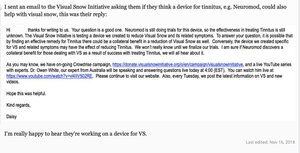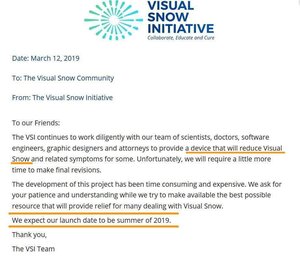The first review has been published:
https://www.tinnitustalk.com/threads/lenire-—-user-experiences-and-reviews.35776/
I find two things remarkable.
1. Tonality, cause of tinnitus, somatic or non-somatic, one ear or both don't matter.
2. Redknight wrote: "My tinnitus tends to increase in volume as I introduce noise. As I sat there in a quiet booth, the tinnitus was barely a low hiss, but as the white noise was introduced my tinnitus ramped up, or at least my perception of it."
My tinnitus reacts to white noise of a noiser of the hearing aid in the same way.
Sometimes I can forget the tinnitus in a quiet environment, then a quiet! water pipe rushes in the house and it is fully present.
I am therefore surprised that sufferers with a phenomenon that could be described either as "reactive tinnitus" or as hyperacusis are admitted to a therapy.
https://www.tinnitustalk.com/threads/lenire-—-user-experiences-and-reviews.35776/
I find two things remarkable.
1. Tonality, cause of tinnitus, somatic or non-somatic, one ear or both don't matter.
2. Redknight wrote: "My tinnitus tends to increase in volume as I introduce noise. As I sat there in a quiet booth, the tinnitus was barely a low hiss, but as the white noise was introduced my tinnitus ramped up, or at least my perception of it."
My tinnitus reacts to white noise of a noiser of the hearing aid in the same way.
Sometimes I can forget the tinnitus in a quiet environment, then a quiet! water pipe rushes in the house and it is fully present.
I am therefore surprised that sufferers with a phenomenon that could be described either as "reactive tinnitus" or as hyperacusis are admitted to a therapy.

 Member
Member





 Has the device made some changes in the brain that now makes you more aware of them, or what?
Has the device made some changes in the brain that now makes you more aware of them, or what?